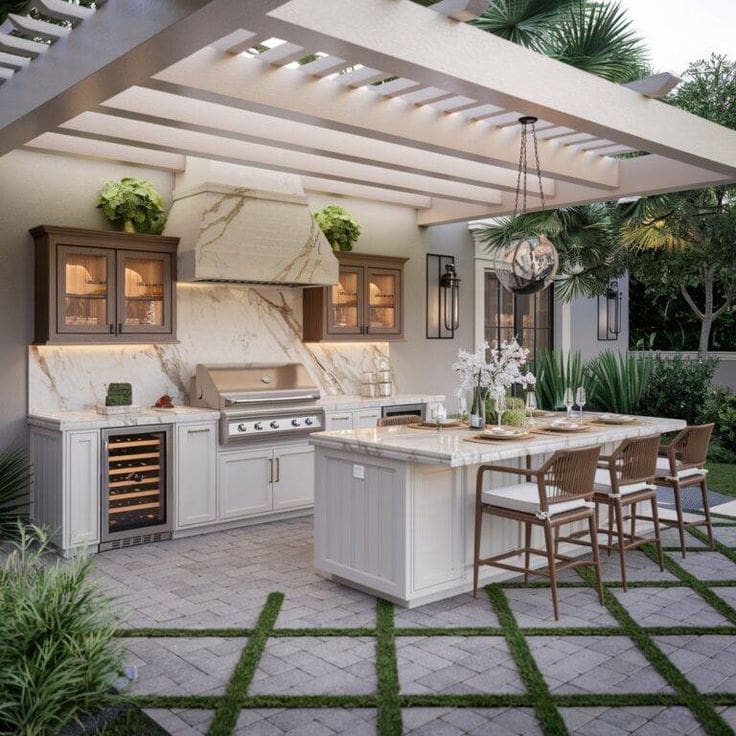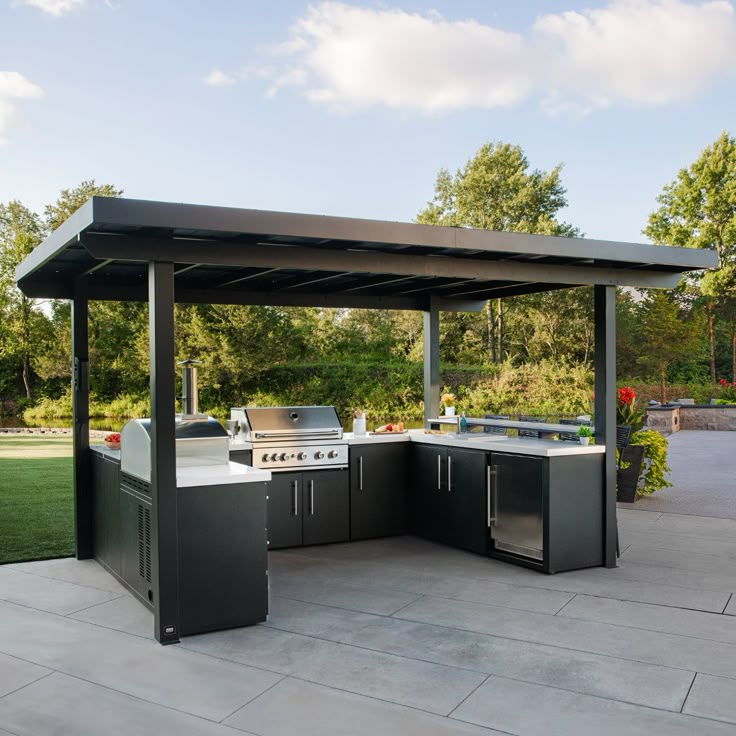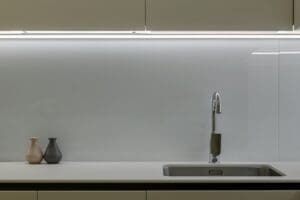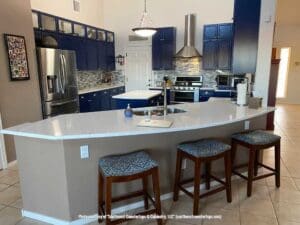Introduction
Many of our readers ask, “What’s the best way to choose a durable and stylish outdoor kitchen countertop that will last for years?”
Picture this: You've finally found time to gather with family, invite friends over for dinner, and cook your favorite dishes. Your indoor kitchen feels a bit cramped, but your outdoor kitchen offers the perfect solution—allowing you to enjoy fresh air, a warm ambiance, and great company.
But then, my eyes land on the countertop… It’s cracked, stained from the rain, and marked by sun damage. How did something that once looked perfect wear down so quickly? Could it be poor-quality stone? And now, what should I do?
Why Do Outdoor Kitchen Countertops Deteriorate?
Outdoor kitchen countertops are constantly exposed to the elements, making them vulnerable to damage over time:
- Rain and humidity can penetrate porous materials, leading to stains and gradual deterioration.
- Sun exposure and high temperatures can cause some stones to fade, weaken, or warp.
- Freezing conditions may lead to cracks if moisture seeps into the stone and expands.
Selecting the right material is essential for ensuring longevity and resilience in any outdoor setting.
To prevent these issues, choosing a stone that can withstand all weather conditions and remain durable for decades is essential. Today, we’ll explore the best stone countertops for outdoor kitchens, which materials to avoid, and the key factors to consider when making your selection.
1. How to choose the best stone for an outdoor kitchen?
 Example of an outdoor kitchen (Photo taken from Pinterest @InforEasyHome)
Example of an outdoor kitchen (Photo taken from Pinterest @InforEasyHome)
Selecting a countertop for an outdoor kitchen isn’t just about style—it’s about durability, too. The stone must withstand diverse weather conditions while maintaining its beauty for years to come. Before making a purchase, it’s important to consider several key factors:
Weather resistance - The material should withstand heat, frost, rain, and humidity without losing its durability.
UV Resistance – Some stones can fade and lose their color vibrancy over time when exposed to direct sunlight.
Easy Maintenance – The less frequent sealing and cleaning needed, the more practical and user-friendly the countertop becomes.
Durability - The ability to withstand impacts, scratches, and general wear is essential for long-lasting performance.
Visual Appeal – The countertop should not only be practical but also enhance the overall design and style of your outdoor kitchen.
By considering these key factors, you can select the ideal stone that will stand the test of time. Now, let’s explore the best options available!
2. Choosing the most durable stone for your outdoor kitchen countertops
Selecting the right countertop material for an outdoor kitchen is essential, as it affects durability, appearance, and maintenance. While granite, quartzite, engineered quartz, and marble are popular choices, not all are built to endure outdoor conditions. Let’s dive into which stones can withstand heat, frost, moisture, and sunlight—and which are best kept indoors.
 Example of colors (from left to right): Granite, Quartzite, Marble, Engineered Quartz
Example of colors (from left to right): Granite, Quartzite, Marble, Engineered Quartz
|
Natural stone
|
Advantages
|
Disadvantages
|
Tip
|
|
Granite
|
✔ Withstands sudden temperature changes.
✔ Does not fade in sunlight.
✔ Virtually scratchproof.
✔ Minimal maintenance: just water and mild detergent.
✔ Huge variety of shades and textures.
|
✘ Requires sealing every 1-2 years.
✘ Can be slippery if the surface is polished.
|
Choose a matte or textured surface for less streaks and scratches.
|
|
Quartzite
|
✔ UV resistant - will not fade over time.
✔ Durable and hard - virtually impossible to scratch.
✔ Resistant to moisture and stains when properly sealed.
✔ Similar in appearance to marble, but much more durable.
|
✘ Requires sealing once a year.
✘ More expensive than other options.
|
Pay attention to lighter shades of quartzite - they heat up less in the sun.
|
|
Engineered quartz
|
✔ Durable and scratch resistant
✔ Wide choice of colors and textures
✔ No sealing required
|
✘ NOT suitable for outdoor use! Burns in the sun, may crack due to temperature fluctuations
|
If you like quartz, consider quartzite - it has a similar appearance but is suitable for outdoor environments
|
|
Marble
|
✔ Luxurious appearance
✔ Unique natural patterns
✔ Cool to the touch - pleasant in hot climates
|
✘ Very porous, gets dirty quickly and requires constant maintenance
✘ Sensitive to acids
✘ May crack due to frost
|
Suitable only for indoor outdoor kitchens or mild climate locations. Requires regular sealing
|
Granite and quartzite are among the best choices for outdoor countertops, built to withstand all weather conditions. Granite is cost-effective and easy to maintain, while quartzite offers exceptional durability with a refined, elegant look. In contrast, engineered quartz and marble are not recommended for outdoor use, as they are susceptible to fading, staining, and cracking. To ensure your countertop remains durable and beautiful for years, choose a stone that suits your climate and usage needs.
3. How to care for stone countertops outdoors?
Outdoor kitchen countertops are continuously exposed to the elements—sun, rain, dust, grease, and temperature changes — all of which can impact their appearance and performance over time. According to the First National Ranking of Stone Countertop Fabricators and Installers in the U.S., following specific care and maintenance steps is essential to preserving the stone’s durability and beauty for years to come.
3.1 Daily Care for Outdoor Stone Countertops
Clean After Every Use
Always wipe down the countertop after cooking, especially if it has come into contact with acidic substances like lemon juice, vinegar, or wine, as well as grease, to prevent stains and surface damage.
Simple rules for cleaning an outdoor countertop:
- Use a soft sponge or microfiber cloth.
- Wipe the surface with warm water and a small amount of mild, pH-neutral soap (such as Seventh Generation Dish Soap).
- For granite and quartzite, use specialized cleaners like Granite Gold Daily Cleaner for optimal care.
- Always dry the surface after cleaning to prevent streaks and water marks.
❌ Avoid stiff brushes, metal sponges, or abrasive cleaners, as they can scratch or damage the surface.
❌ Do not use cleaning products containing ammonia, vinegar, or citric acid, as these can erode the sealant and cause the stone to lose its shine.
3.2. Deep Cleaning and Countertop Protection
Weekly Deep Cleaning
Despite regular daily care, grease, grill residue, and fine dust can gradually build up on the surface. A deep cleaning once a week helps maintain the stone’s pristine appearance and prevents stubborn stains from developing.
The best cleaners for natural stone:
- Weiman Granite & Stone Cleaner & Polish - Enhances shine, protects against stains, and preserves the sealant.
- Method Daily Granite Cleaner - An organic, food-safe cleaner ideal for everyday use..
- Trinova Granite Cleaner & Polish - Effectively removes grease stains while creating a protective barrier.
Annual Maintenance – Reseal if Needed
Certain stones, such as granite and quartzite, require periodic sealing to protect against moisture and stains. Without a proper sealant, the stone can absorb liquids, leading to discoloration, stains, and even micro-cracks over time.
How to Check If Your Countertop Needs Resealing?
- Place a few drops of water on the surface..
- If the water is absorbed within 10 minutes and leaves a dark stain, the sealant is no longer effective and needs to be reapplied.
The best sealers for stone countertops:
- StoneTech BulletProof Sealer - Ideal for outdoor granite and quartzite, offering long-lasting protection.
- Miracle Sealants 511 Impregnator - A versatile sealer suitable for all natural stones.
- Black Diamond Stoneworks Sealer - Great for regular maintenance and frequent reapplication of the protective layer.
How to seal a stone countertop?
- Clean and dry the surface thoroughly.
- Apply the sealer evenly using a microfiber cloth or brush.
- Let it absorb for 10–15 minutes (or as directed by the product instructions).
- Wipe off excess sealer with a soft, dry cloth.
- Allow 24 hours for the sealant to fully cure before using the countertop.
If you're unsure about sealing the stone yourself, it's best to consult a professional, as mistakes can be difficult to fix. However, if you're confident in your skills, these steps will guide you through the process.
3.3. Additional Tips for Maintaining Your Outdoor Kitchen Countertops
Use Cutting Boards and Heat-Resistant Pads
To prevent scratches and heat damage, avoid cutting food directly on the stone and always use a trivet or heat-resistant pad for hot pots and pans.
Protection from Sun, Rain, Snow, and Other Elements
Some stones, such as dark granite, can become extremely hot under direct sunlight. Conversely, even moisture-resistant stones may gradually change color over time due to prolonged exposure to water. If your outdoor kitchen is in an open area, installing a canopy or cover can help protect the countertop from heat damage, discoloration, and long-term wear.
The Best Outdoor Kitchen Awnings for Various U.S. Regions
 An example of an outdoor kitchen with a canopy (Photo taken from Pinterest @backyarddiscovery)
An example of an outdoor kitchen with a canopy (Photo taken from Pinterest @backyarddiscovery)
Hot & Sunny Regions (California, Texas, Arizona) - use a polycarbonate or vented metal roof to reduce heat gain.
Rainy Regions (Washington, Oregon) - Opt for a pitched metal or asphalt shingle roofs to ensure proper water drainage and prevent pooling.
Cold & Snowy Regions (Colorado, Minnesota, New York) - Choose a structure designed to withstand heavy snow loads, such as metal or durable polycarbonate roofing.
Windy Areas (Florida, Oklahoma) - Install sturdy, reinforced structures with aluminum or steel frames anchored securely to withstand strong winds.
4. The Best Stone for Outdoor Kitchen Countertops: Top Choices by Homeowners
Despite in-depth research, we felt it was essential to hear firsthand experiences from homeowners who have installed granite and quartzite countertops. After all, theory is one thing, but real-life use shows how these stones withstand years of outdoor exposure..
We found the following reviews on Reddit:
"I installed a granite countertop in my outdoor kitchen about five years ago. It has endured everything—from summer heat to winter frost—and still looks as good as new. I highly recommend granite to anyone looking for a durable and aesthetically pleasing material for outdoor use."
"We chose quartzite for our outdoor kitchen because of its beauty and durability. After three years of use, it still looks fantastic and requires very little maintenance. The only thing we do is wipe it down occasionally with a soft cloth."
Real Owner Reviews: Granite and Quartzite for Outdoor Countertops
These real reviews from outdoor kitchen owners confirm that granite and quartzite are excellent choices for outdoor countertops. Each material has its own advantages—granite is renowned for its durability, while quartzite offers a perfect balance of beauty and strength. Ultimately, the choice comes down to personal preference, but both have proven to be highly reliable in real-world conditions.
FAQ: Outdoor Kitchen Countertops: Key Questions and Answers to Know Before Buying
Which Stone Is the Best for an Outdoor Kitchen and Can Withstand All Weather Conditions?
Granite and quartzite are the most reliable choices for outdoor countertops. They withstand heat, frost, rain, and UV exposure, making them ideal for all-weather conditions. Granite is durable, resistant to mechanical damage and easy to maintain. Quartzite combines the elegance of marble with high durability and UV resistance.
Do stone countertops in an outdoor kitchen need sealing?
Yes, granite and quartzite require periodic sealing, typically once a year, to protect the surface from moisture, stains, and dirt. Sealing creates a protective barrier that prevents liquids from penetrating the stone’s pores, helping to preserve its durability and extend its lifespan.
What are the most common mistakes when choosing stone for an outdoor kitchen?
One of the biggest mistakes is selecting engineered quartz, which can fade under sunlight and crack due to temperature changes. Another common oversight is neglecting regular maintenance, such as timely resealing, which is crucial for preserving the stone’s durability. Additionally, choosing very light-colored countertops can be impractical, as they tend to show dirt and stains more easily.
Conclusion
Choosing a countertop for an outdoor kitchen isn’t just about style, it’s also about practicality. The stone must be able to withstand temperature changes, sun, rain and mechanical stress. Granite and quartzite are the best options that have proven their durability in real-world conditions. Granite is durable and versatile, while quartzite combines beauty and sustainability.
We hope this guide has helped you choose the right material for your outdoor kitchen. However, one crucial step remains—finding a skilled and reliable contractor to fabricate and install your countertop with precision. Even the highest-quality stone can develop cracks, uneven surfaces, and premature wear if not installed correctly, making expert craftsmanship essential for long-lasting results.
To simplify your search, the First National Ranking of Stone Countertop Fabricators & Installers has already done the legwork for you. Our ranking showcases the top certified stone countertop experts across cities in the United States, making it easy to find trusted professionals for your project.
Choose a trusted contractor in your city



 Example of an outdoor kitchen (Photo taken from Pinterest @InforEasyHome)
Example of an outdoor kitchen (Photo taken from Pinterest @InforEasyHome) Example of colors (from left to right): Granite, Quartzite, Marble, Engineered Quartz
Example of colors (from left to right): Granite, Quartzite, Marble, Engineered Quartz An example of an outdoor kitchen with a canopy (Photo taken from Pinterest @backyarddiscovery)
An example of an outdoor kitchen with a canopy (Photo taken from Pinterest @backyarddiscovery)






